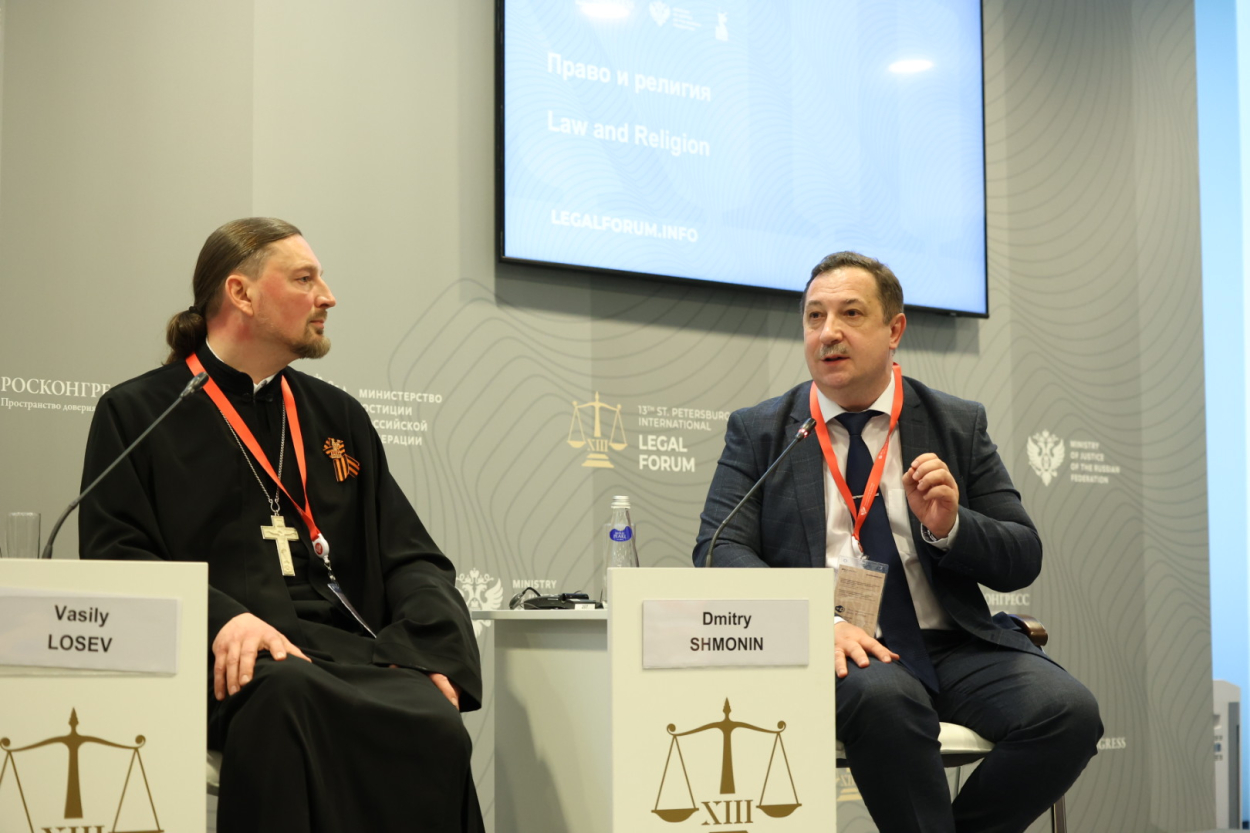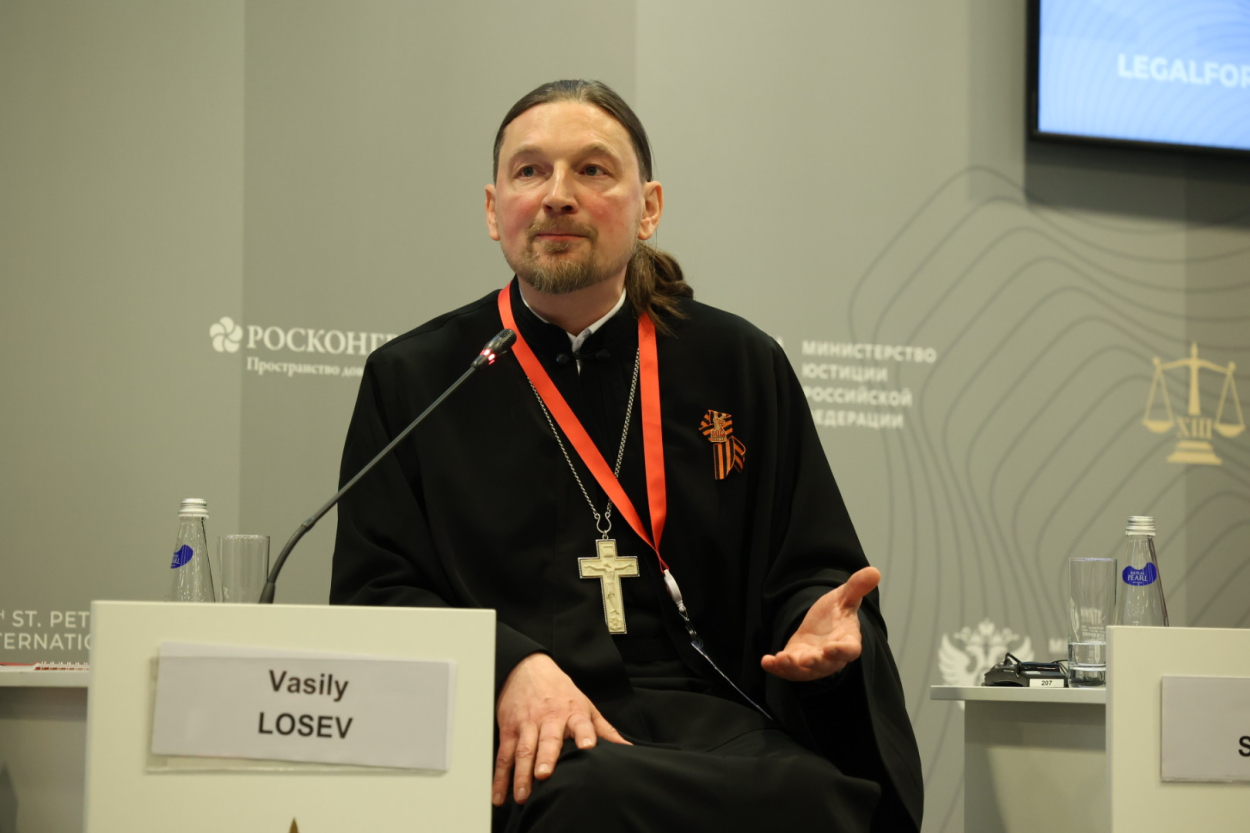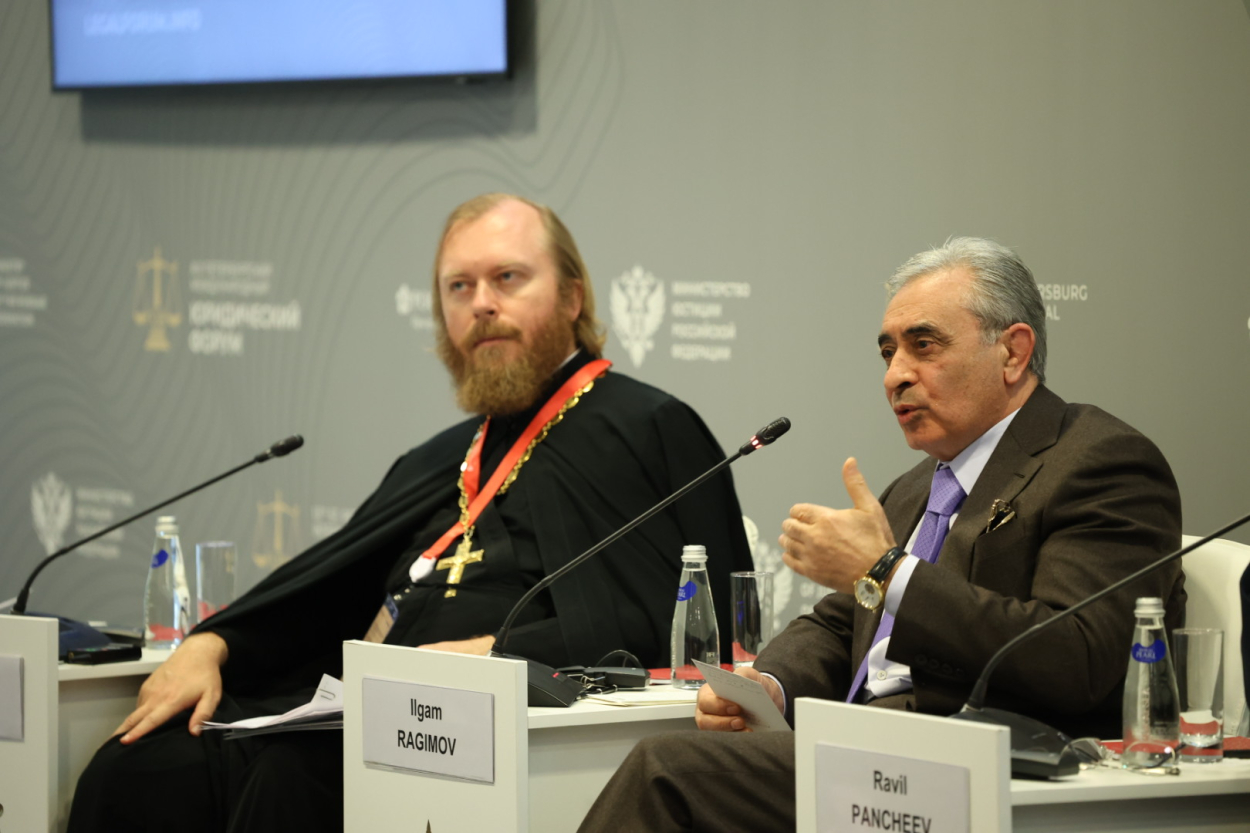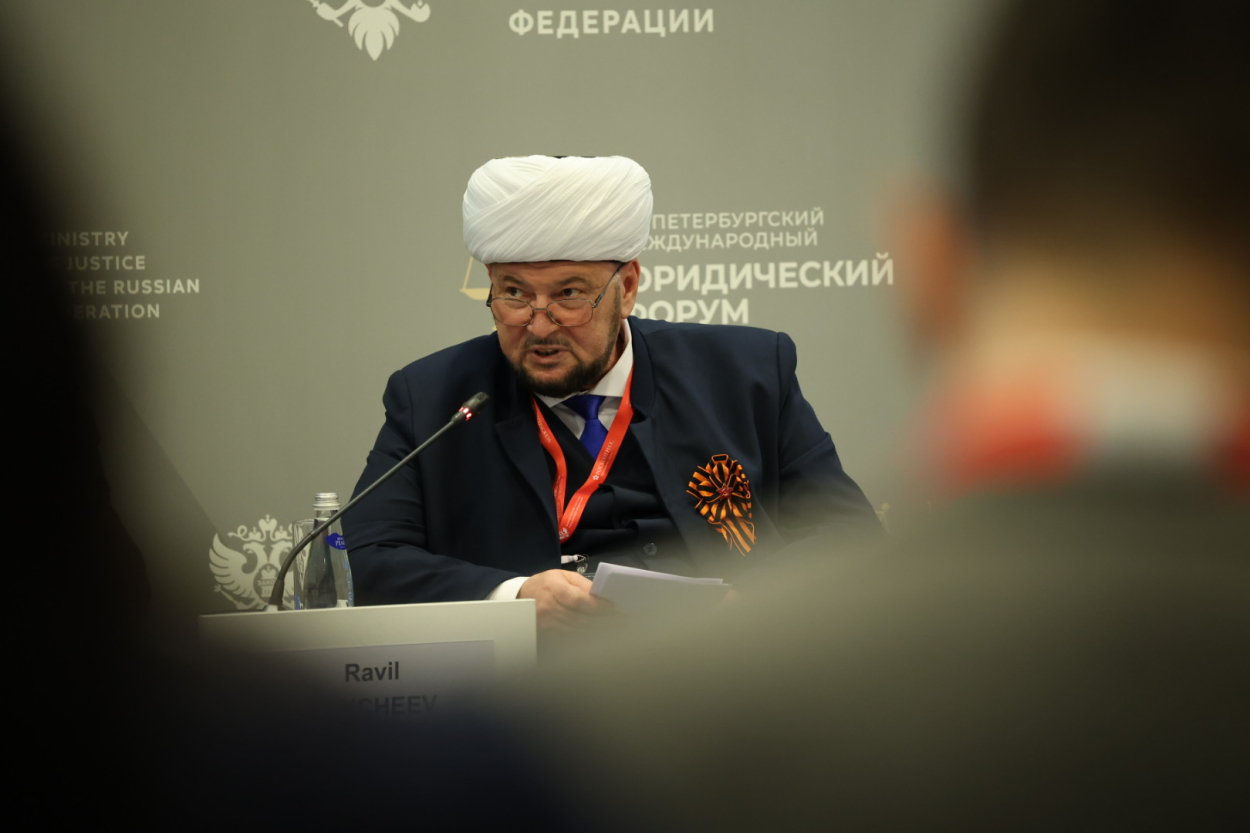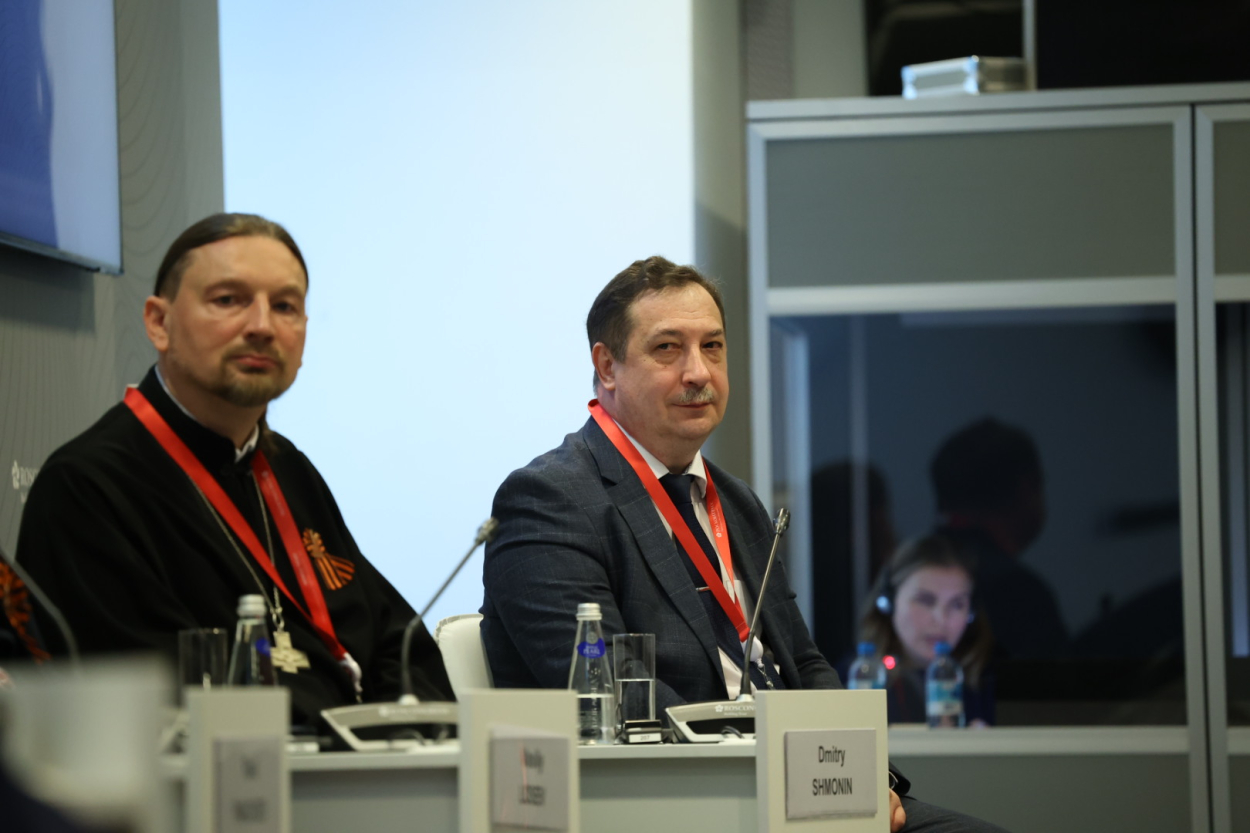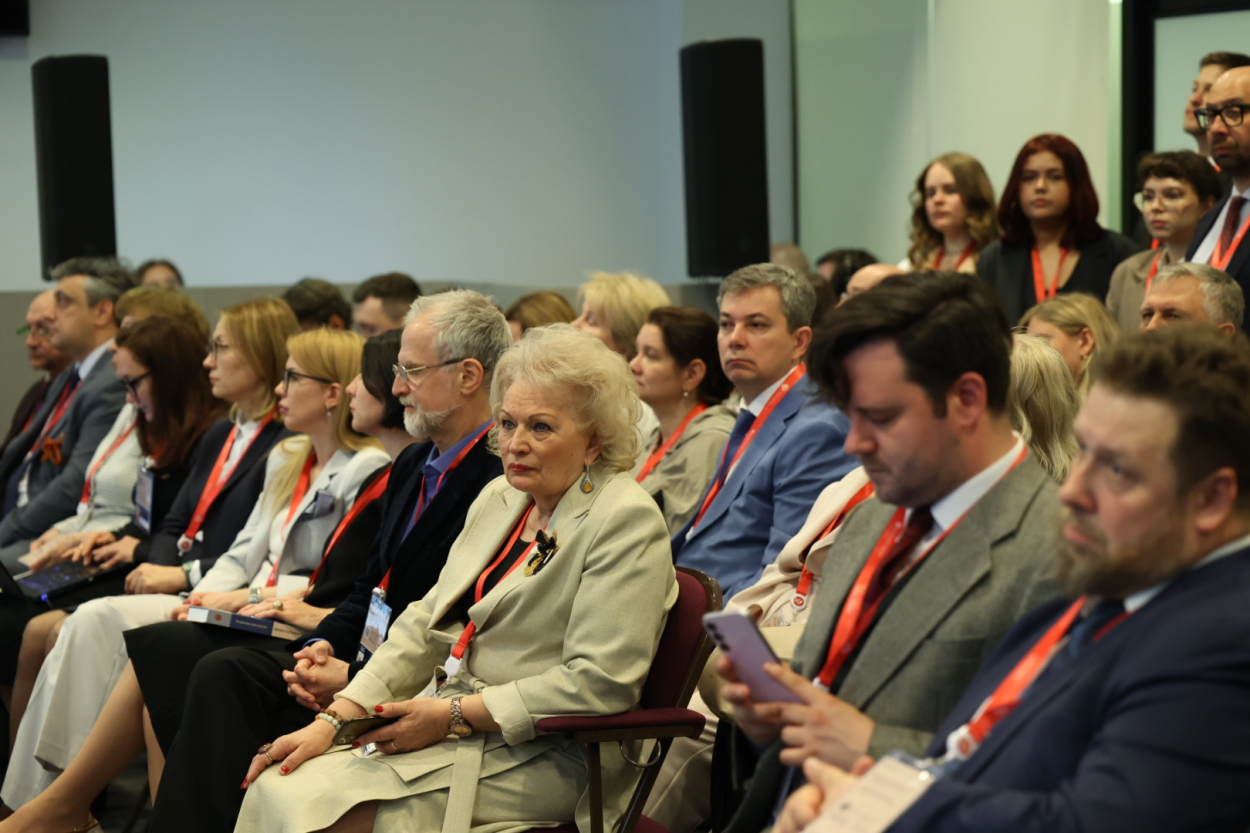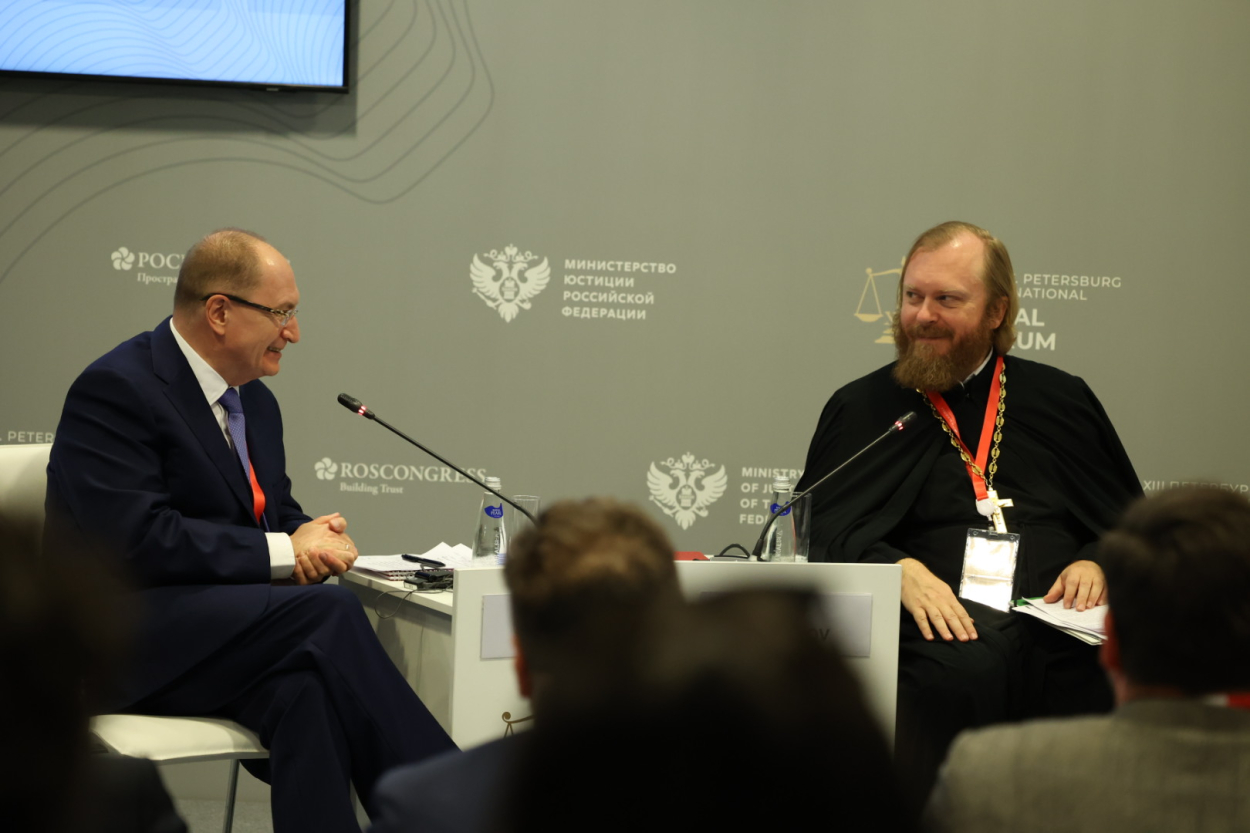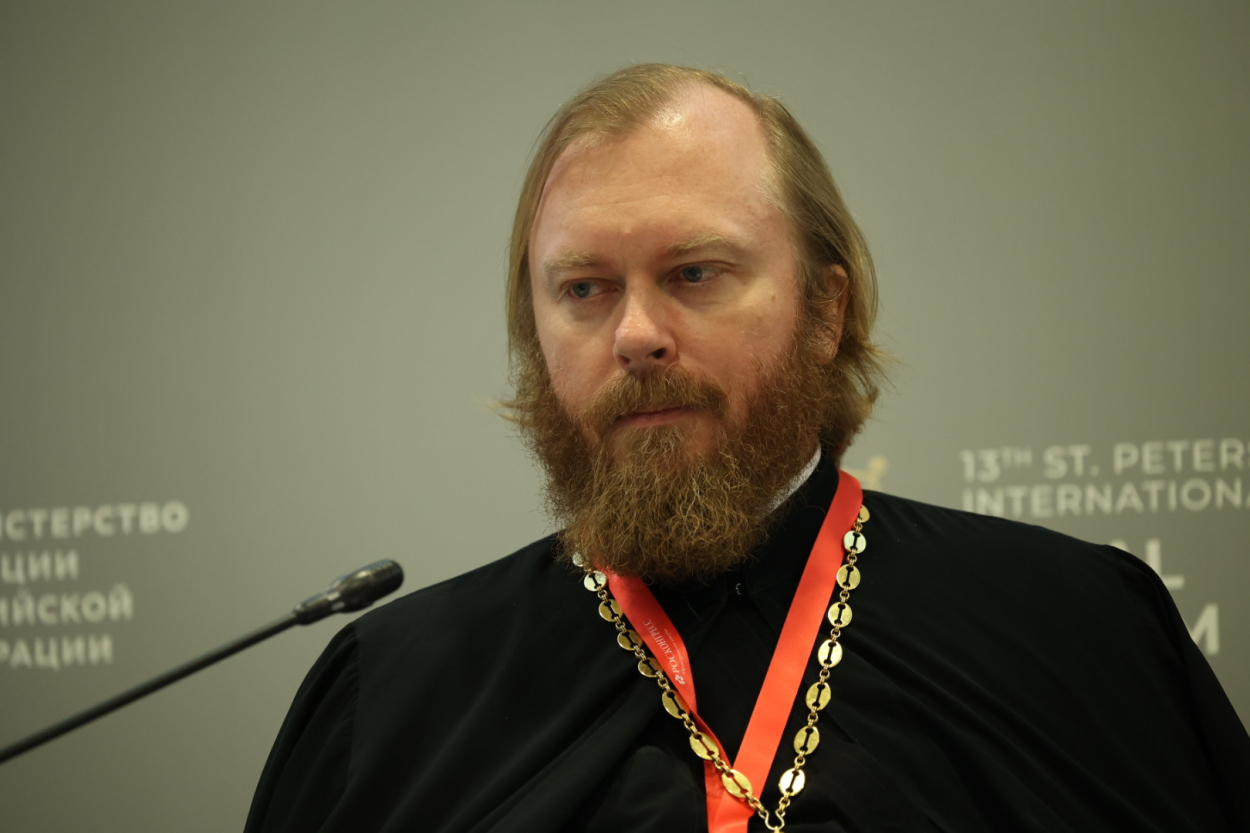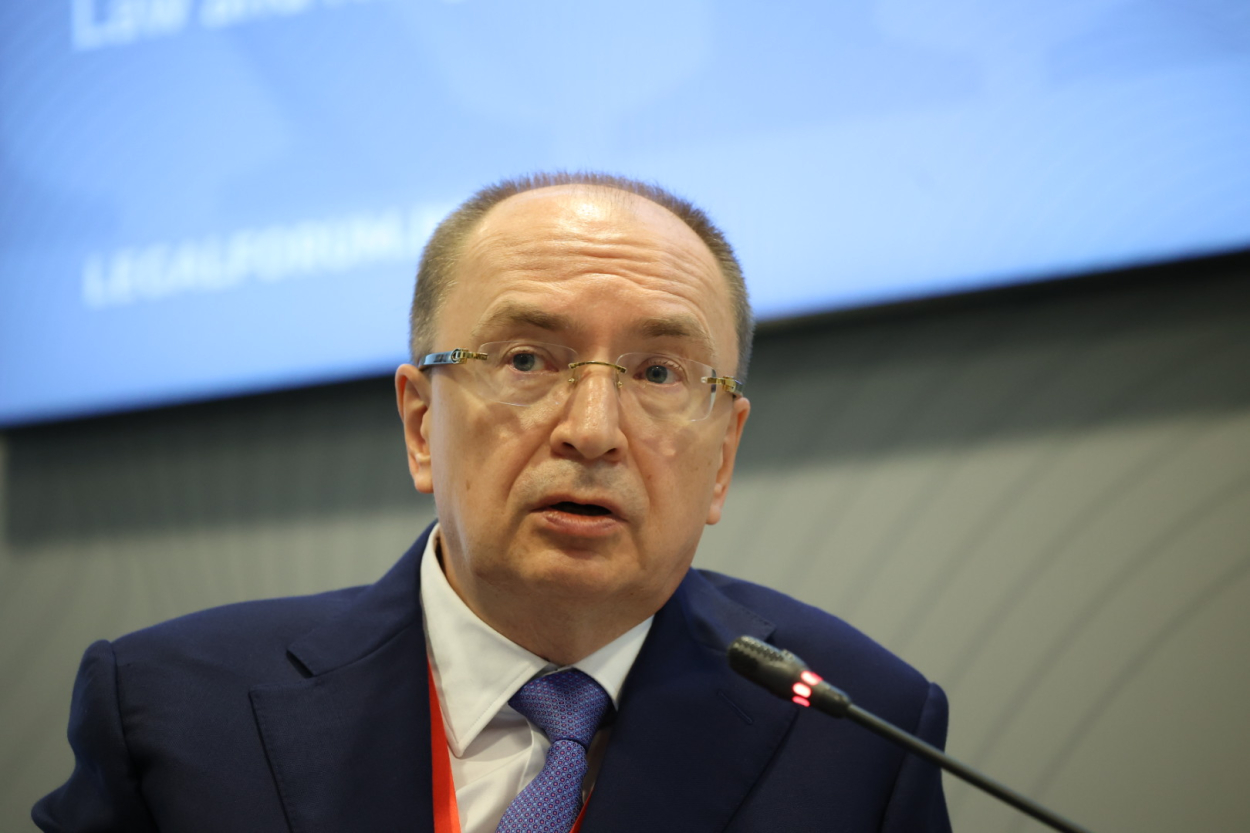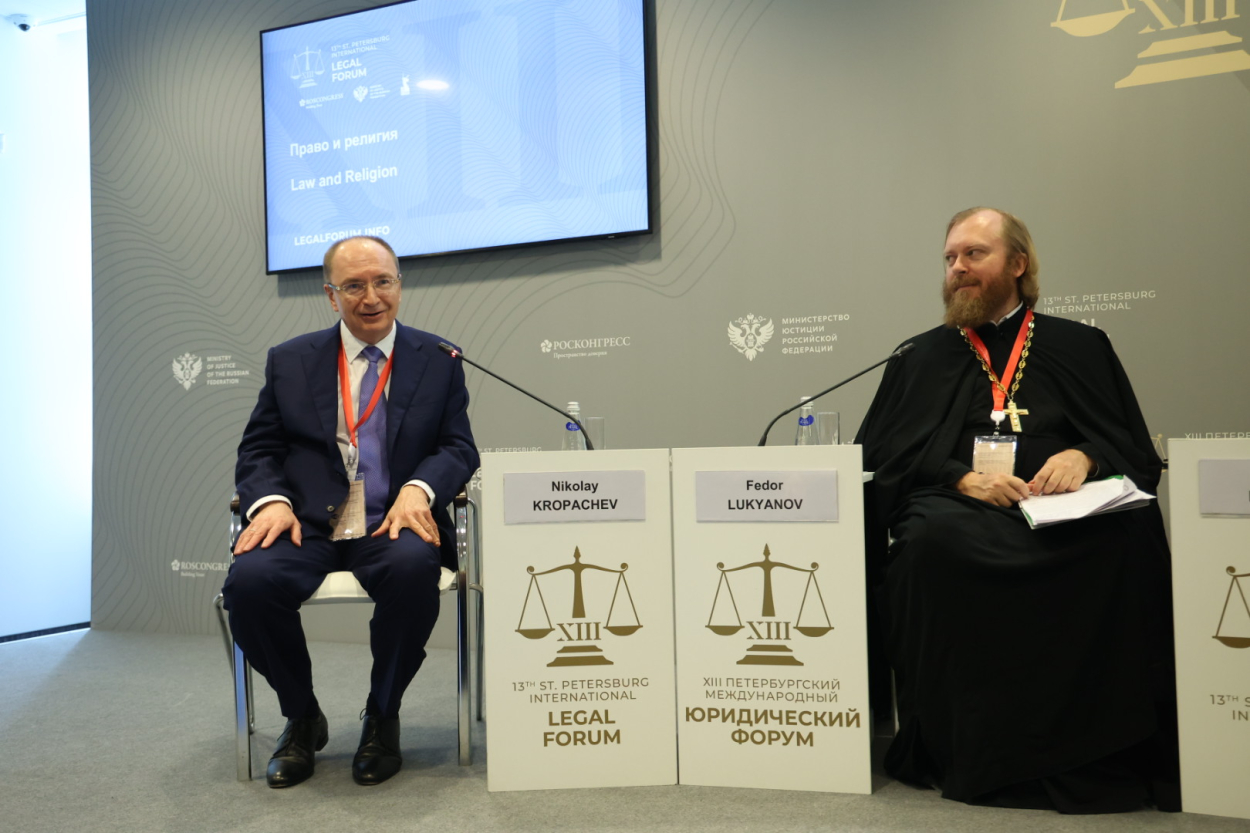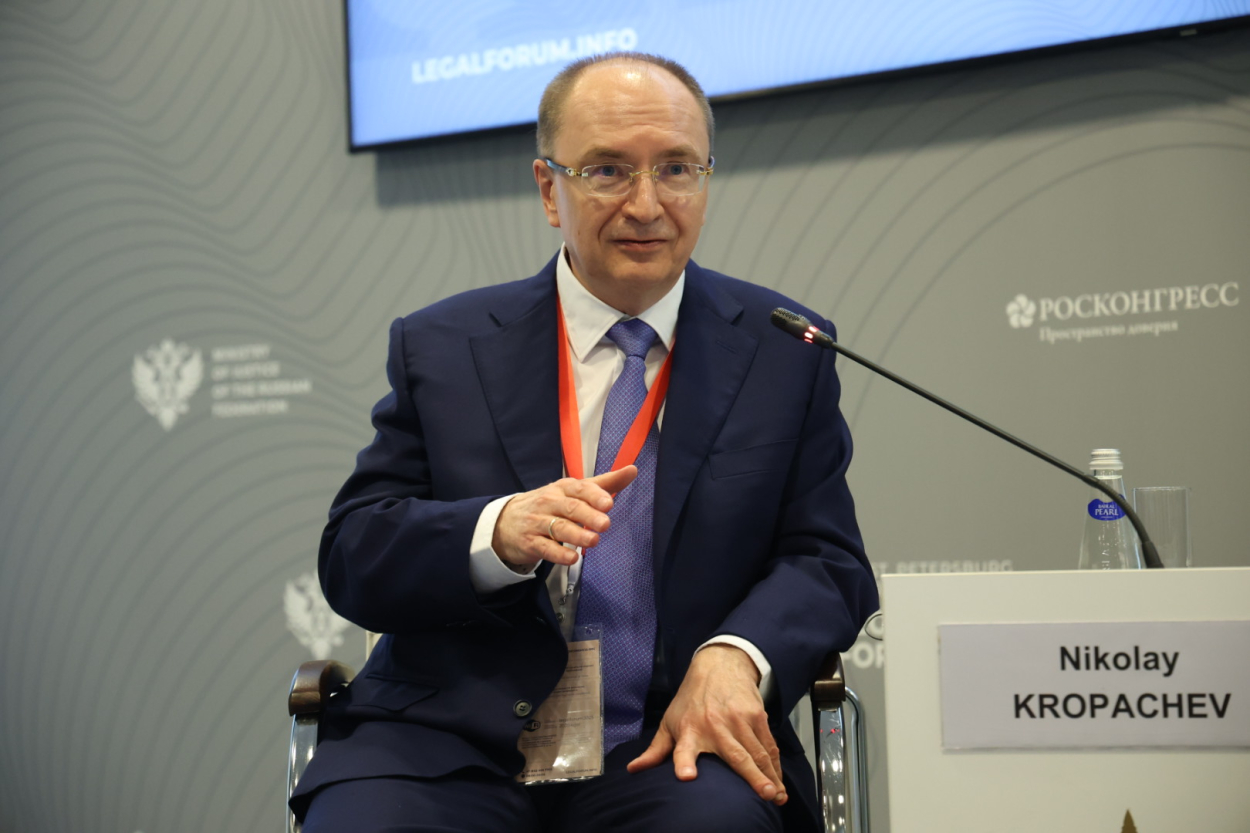St Petersburg University at the St Petersburg International Legal Forum 2025: Law and religion — different methods, one goal
During the St Petersburg International Forum, representatives of the clergy and the legal community have discussed various aspects of how religion and law can interact as two spheres of social life and what the connection between them is. The moderator of the discussion was Nikolay Kropachev, Rector of St Petersburg University, Member of the Bureau of the Presidium of the World Russian People’s Council.
Opening the discussion, the Rector of St Petersburg University said that we had been incorporating the topic of religion in the programmes of Russian and international forums for several years. The St Petersburg International Economic Forum 2024 raised the most important issue of the need to grant the family the status of a subject of Russian law. However, according to Nikolay Kropachev, such problems should be considered following a comprehensive approach: from the religious economic, religious-cultural, and religious-legal perspectives, and a platform for the discussion can be an ideological forum, which he has previously proposed to hold in St Petersburg under the auspices of His Holiness Patriarch Kirill of Moscow and All Rus’ and with the participation of representatives of all traditional religions of Russia and other countries.
Nikolay Kropachev’s proposal to incorporate the topic of education and religion in the themes of all major international forums, e.g. the St Petersburg International Economic Forum (economic issues of religious education), St Petersburg International United Cultures Forum (religious education and culture), was supported by Bishop Methodius of Yegoryevsk, Rector of the St Tikhon’s Orthodox University of the Humanities, who heads the Synodal Biblical and Theological Commission and the Commission on Theology and Theological Education of the Inter-Council Presence of the Russian Orthodox Church. This topic should be considered through the prism of universities that successfully combine theological and secular education, the bishop said in his address to the participants in the discussion.
‘The topic of religious, theological, spiritual, and moral education will enable us to discuss current issues that will be important for the future of our country and society and will ensure a deeper understanding of the spiritual and moral values that are deeply rooted in our traditional religions,’ said Bishop Methodius.
Priest Fedor Lukianov, Chairman of the Patriarchal Commission on Family Issues, Protection of Motherhood and Childhood, raised the issue of ethical codes, which currently have a major impact on the subjects of law enforcement. The moral and ethical components are deeply rooted in history and refer to Christian rules for building human relationships.
‘The essence of ethical codes is to make the law enforcement process fairer, more humane, objective, and justified from the point of view of norms, morality and law, and universally accepted human values,’ said Father Fedor Lukianov. ‘In light of state policy on preserving and strengthening traditional values and incorporating them into various acts of law, we are witnessing an increased interest on the part of theorists and practising lawyers in issues of updating the application of religious norms, in our case Christian ethics and morality, in current secular law enforcement and lawmaking.’
Judicial ethics as the science of the application of moral norms in rather specific conditions does not create a separate new type of lawyer’s morality, but concentrates its attention on the mechanism of application of spiritual and moral norms long developed by Christian civilisation in their professional activity.
Priest Fedor Lukianov, Chairman of the Patriarchal Commission on Family Issues, Protection of Motherhood and Childhood
Nikolay Kropachev, Rector of St Petersburg University, invited Priest Fedor Lukianov and Kirill Zinkovsky, President of the Scientific and Educational Theological Association, to take part in creating an ethical code for Russian universities.
Mufti Ravil Pancheev, Chairman of the Spiritual Administration of Muslims of St Petersburg and the Northwestern Federal District of Russia, said that religion has regulated secular relations since ancient times, and law at certain stages of history in some countries found its expression precisely in religious dogmas. The close connection between law and religion can be seen in almost all legal systems of the peoples of the world.
‘At the dawn of time, legal norms were inextricably linked with religious regulations. The most ancient legal norms were simultaneously religious laws and only over time separated from them. In early class states, religious norms were passed from mouth to mouth in myths, found expression in customs, rituals, and ceremonies. Later, they were reflected in the decrees of political power and in theological works. Judaism, Christianity, and Islam enshrined their religious norms in sacred scriptures and normative and legal acts of the highest political power based on them,’ said Ravil Pancheev. ‘In modern society, religion is called upon to serve as a moral compass, guiding people towards tolerance and compassion. The law officially guarantees the implementation of citizen’s rights to freedom of religion, recognising religious diversity and based on the principles of tolerance.’
According to Ilham Rahimov, President of the Association of Lawyers of the Black Sea-Caspian Region, foreign member of the Russian Academy of Sciences, graduate and Honorary Doctor of St Petersburg University, law and religion pursue one goal, i.e. the moral improvement of person in society and thereby the development of all humankind.
‘The only difference is in the method they use. Law uses certain warnings, corresponding normative regulations through the mind and reason of man. Religion, on the contrary, affects our heart and soul through advice,’ Ilham Rahimov shared his thoughts.
The session was attended by Archpriest Vasilii Losev, Head of the Legal Service of the Moscow Metropolitanate, who focused on the importance of socially significant forums in discussing the relationship between the norms of state law and the regulations of religious organisations in a number of practical issues in medicine, finance, the preservation and use of cultural heritage sites, and law enforcement practices in relation to religious organisations.
Dmitrii Shmonin, Director of the Institute of Theology at St Petersburg University, Chairman of the Expert Council of the Higher Assessment Committee on Theology under the Ministry of Science and Higher Education of Russia, Professor of St Petersburg University, reminded the participants in the discussion about justice as fairness and law and about theology as a marker of traditional religions. The ideological foundations underpin the teachings of religious doctrines, which find their expression in traditional Russian spiritual and moral values. ‘It is vital to understand this role of the theology of traditional religions in research and education, media space, and society. It is necessary to ensure a theological component in the teaching of social and humanitarian courses, in interdisciplinary research, including ethical, legal, and economic issues,’ said Dmitrii Shmonin, proposing the inclusion of relevant thematic discussions in the agenda of the upcoming major forums.
The discussion brought together Professor Roman Svetlov, Head of the Department of Theology and Church History at St Petersburg University; Professor Igor Tantlevskii, Head of the Department of Jewish Theology and Jewish Culture at St Petersburg University; Viacheslav Kondurov, Associate Professor in the Department of Constitutional Law at St Petersburg University; Svetlana Nuzhdina, Director of the Centre for Religion and Law at the National Research University Higher School of Economics; Aleksandr Marei, Associate Professor of the National Research University Higher School of Economics; and Igor Ponkin, Professor of the Institute of Public Administration and Management at the Russian Presidential Academy of National Economy and Public Administration (RANEPA) to name just a few.
The moderator of the meeting, Nikolay Kropachev, invited them to share their opinions on the topic presented during the session and to send materials that are planned to be published in the format of proceedings of the discussion.
St Petersburg University cooperates with representatives of traditional religions and is ready to take into account their accumulated experience in protecting spiritual and moral values. The issues of the influence of religious values on law, ways of their implementation and consideration in the current legal regulation are actively studied at St Petersburg University, which serves as a platform for discussion and the organiser of round tables and conferences.
In the autumn of 2024, St Petersburg University, together with the Spiritual Administration of Muslims of St Petersburg and the Northwestern Federal District of Russia, the Spiritual Administration of Muslims of the Asian Part of Russia, the Department of External Church Relations of the Moscow Patriarchate, and the Foundation for the Support of Islamic Culture, Science and Education, held the 1st International Religious Summit in St Petersburg. Among its participants were scholars, religious, public and political figures, and theologians from more than 50 countries. This spring, the University hosted a meeting of the Committee on Improving Legislation and Law Enforcement Practices of the Presidential Council for Coordination with Religious Organisations of the Russian Federation.



